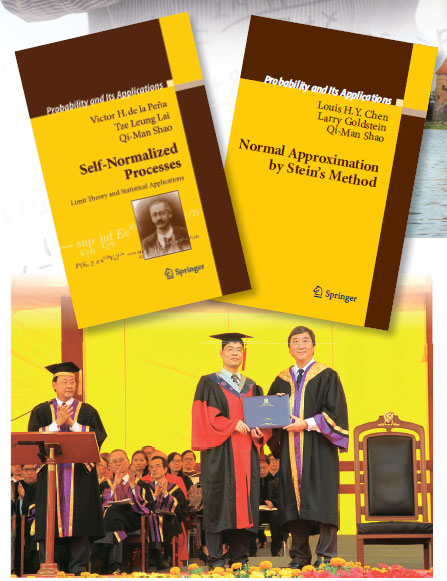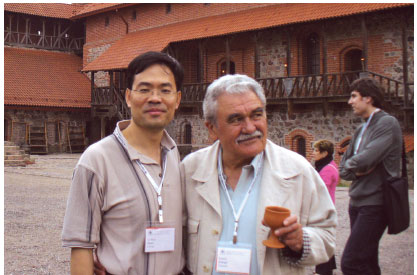True measures of success
Updated: 2016-01-19 08:48
(HK Edition)
|
|||||||
Shao Qiman was teaching classes as he did on most days. There was nothing in his behavior to give away that he had just won a major award. On Jan 8 Shao received the second-class State Natural Science Awards 2015 in Beijing for his research in the Central Limit Theorem in the field of probability and statistics.
Shao led a team of academics and researchers, including Professor Jing Bingyi, at Hong Kong University of Science and Technology (HKUST) to come up with the winning project. The inference drawn is being considered a giant leap from the classic probability theory, the fruits of which could be used to beneficial effects in genetic therapy and risk control. They might be used to forecast public opinion surveys and help eradicate agricultural pests.
A large white board hangs on the wall facing the door leading to his office in the Chinese University of Hong Kong (CUHK). Scrawled on it are a bunch of "x"s in a tangle, root signs, para-curves, formulae and various mathematical codes. A large bookcase is stuffed with voluminous tomes, some of which are worn out, due to repeated use.
Shao's research on self-normalized processes takes the law of large numbers and probability theory forward by a few notches. His research is towards the assessment and quantification of the possible errors in a given case. And the inferences of his research could be used as a tool for analysts to measure the accuracy of predictions, thereby reducing possible errors.
Medical researchers could use Shao's research to pinpoint genomes that are most likely to cause a certain disease like tumor, laying a foundation for gene therapy. Insurance companies can employ it to work out the safest insurance premiums to minimize the odds of bankruptcy. Policy makers could apply it to make forecasts regarding public attitudes to a certain policy more accurately and objectively.
Humble beginning
Shao was born into a rural family in 1962 in Yuhuan county of Zhejiang province. Education was free except none of his siblings were too keen on it. Shao, however, was determined to attend school.
He had won the first prize in a math contest at high school but failed to make the score in the college entrance exam. He had gone back home to be a farm hand, but half a year later his teacher called him back. The school had organized a tutoring class for students like Shao who flunked the exam but was recognized as having the potential to make it with a bit of guidance.
Shao was admitted to the mathematics department of Hangzhou University the next year. He shone from the very outset, getting a perfect score at most exams.
"It was my professor, Lu, who gave me a key to the world of math," Shao said. He recalled listening to his teacher, who held free workshops on probability almost every evening.
One day, Lu read out a paper to the class about independent events, a fundamental concept in probability. "I spotted a potential problem with a hypothesis in the paper, so I spent a long time trying to find exceptions that ran counter to it. Finally, I managed to disprove the theory and drafted a dissertation," said Shao with a coy grin.
The dissertation was not published until a decade later. In 1993 he went to Canada to visit a Hungarian mathematician, M. Csrg, the author of the book Strong Approximations in Probability and Statistics which he had read as a student. The two clicked. They collaborated to compile a report on the notion of independence, and would have published it together with Shao's previous dissertation. But Shao did not keep the original draft.
"Unexpectedly, Professor Lu had kept the draft, holding on to it like it were a treasure trove. I knew I made him proud."
From strength to strength
Shao says he likes reading books while seeking answers to unsolved puzzles or challenging tentative theories. "I'm fascinated by statistical theories that are not only interesting but have practical use as well."
He had been teaching at Hangzhou University since 1986. He was made an associate professor in 1988 at 25, one of the youngest ever to hold such a senior post in the institution.
In the next decades, Shao delved into research on limiting distribution theory and dependent and independent random variables theory, and went on to win awards in the field.
In 2001, Shao was appointed a Fellow of the Institute of Mathematical Statistics, an authoritative organization on mathematical statistics studies that only international top scholars could get access to.
Just as his career was peaking, Shao left the United States for Hong Kong in 2005, although the University of Oregon offered him tenure. "Having stayed overseas for many years, none of the countries made me feel at home. Only my country makes me comfortable." He chose Hong Kong because he says the city allows him to access information from home and abroad, which is vital for academic research.
According to Professor Cheung Siu-hung, his colleague in CUHK, Shao being on board makes a major difference to the Department of Statistics. "He places a premium on academic exchange on a global scale," says Cheung. The fourth Institute of Mathematical Statistics Asia Pacific Rim Meeting to be held in Hong Kong in June is Shao's baby. "His charm lies in his uprightness and modesty," says Cheung.
Professor Lin Yuanyuan, another colleague, says as the department chair Shao pays special attention to younger colleagues. "He would try his best to convince the university management to provide project funding for our young faculty members."
"He is also quite a funny character and a person passionate about life," laughs Lin, "He often talks about food, diet, and even housework with us when we dine together."
One of his passions is hiking. Going on hikes helps clear the mind and facilitates better flow of ideas. He has often found answers to a question he had been pondering about in the middle of a trail. "I like working my mind while hiking or jogging. Certain calculations are better done in the mind, without pen and paper."
Shao did not bother to circulate the news of his winning the award. He did not even inform his 90-year-old mother and siblings, who still live in the old village, and probably won't tell them in the near future. "It is not a big deal," he muttered shyly. "For me research is just a habit. It's only a part of my daily routine."
Contact the writer at jenny@chinadailyhk.com
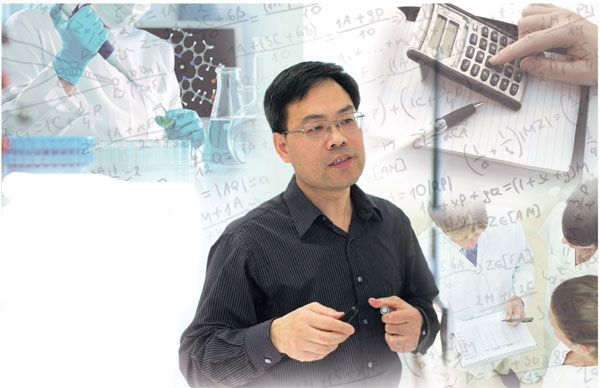
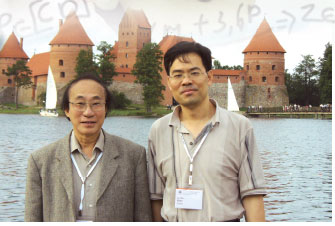
|
The findings of Shao Qiman (center), seen here with the CUHK Vice-Chancellor Joseph Sung Jao-yiu, might help minimize errors in data-based predictions. |

|
M. Csrg (right), a Hungarian mathematician, helped Shao Qiman take his academic career forward. Photos provided to China Daily |
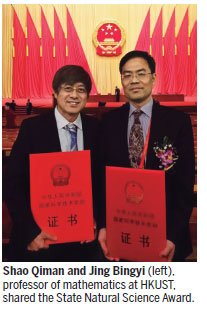
(HK Edition 01/19/2016 page10)
